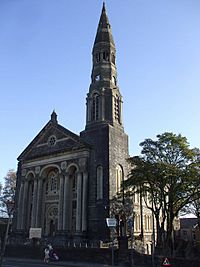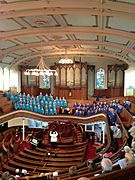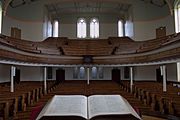Tabernacle Chapel, Morriston facts for kids
Quick facts for kids Tabernacle Chapel |
|
|---|---|
|
Capel y Tabernacl
|
|
 |
|
| Location | Morriston, Swansea |
| Country | Wales |
| Denomination | Union of Welsh Independents |
| Website | morristontabernacl.org |
| Architecture | |
| Heritage designation | Grade I |
| Designated | 30 September 1993 |
| Architect(s) | John Humphrey |
| Years built | 1874-1877, additions through 1890 |
| Completed | 1872 |
The Tabernacle Chapel, also known as Libanus Chapel, is a very important and beautiful building in Morriston, Swansea, Wales. In Welsh, it's called Capel y Tabernacl. It's so special that it's a Grade I listed building, which means it's one of the most important historic buildings in the country.
Contents
History of Tabernacle Chapel
Building the Chapel
The Tabernacle Chapel was designed by an architect named John Humphrey. It was built in 1872 and cost a lot of money at the time – about £15,000. This was a huge amount back then! The people who built it worked for over forty years to pay off the debt. They even had a special celebration on New Year's Day in 1914 to mark paying it all off.
A Grand Place of Worship
This chapel is very large and can seat up to 3,000 people. Because of its size and importance, it has been called the "Nonconformist Cathedral of Wales." Nonconformist churches are Christian churches that are not part of the official Church of England.
The design of the Tabernacle Chapel was so popular that many other chapels in Wales copied its style. Inside, the pulpit is the main focus. Below it is the Sedd Fawr, which means "big seat" in Welsh. This is where the deacons, who are church leaders, sit.
Above the organ, you can see a message written in Welsh. It says: Addolwch yr Arglwydd mewn Prydferthwch Sancteiddrwydd. This means "Worship ye the Lord in the Beauty of Holiness" and comes from a Bible verse in Psalm 96.
Music and Discovery
The chapel is not just for services; it's also a place for music. Two local choirs, the Tabernacle Morriston Choir and the Morriston Ladies Choir, use it for practice and performances.
In 2012, during some restoration work, something interesting was found. Workers discovered a old sixpenny coin that had been placed under the original pinnacle of the building. This coin was put there in 1872 by the daughter of Daniel Edwards, who was the builder of the chapel. Finding a coin like this is quite unusual for a Nonconformist church.
Gallery
 | Laphonza Butler |
 | Daisy Bates |
 | Elizabeth Piper Ensley |



